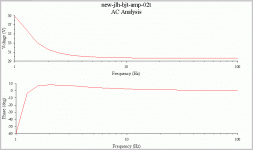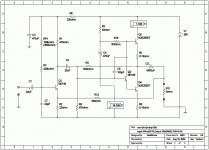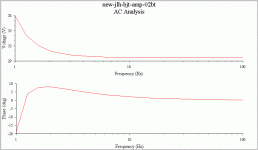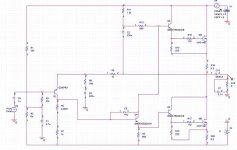Hi Darkhorse,
Hey, there's no need for you to say sorry !
You are taking the trouble to freely report your findings, and I applaud your genuine and on-going effort.
Power supplies have their own equivalent of a low frequency roll-off, whereby the rail voltage becomes increasingly modified by output stage current draw with falling frequency.
The JLH does not have a good rejection ratio below audio frequencies, and CD output does not need to go as low as 2Hz for power rail plus input effects to cause alternating output stage zero shifting. This can be made worse due to the phase shifts of two series 'C's within the NFB loop interfering with stabilisation.
I first tried this about 30 years ago. I even tried two feedback resistors of twice the value, but connected one to each side of the output capacitor in place of the single feedback component; I suppose your nearest E12 values would be either 1k2 or 1k5.
This does remove the infra-sonic tuned peak due to phase shift within the closed feedback loop, but the arrangement might not help when there are psu related weaknesses.
A larger C3 might also help stabilise output biasing.
I used much larger value capacitors than the originals for my JLH circuit constructions. This much improved the bass driver control and damping, and as a result I never thought that there was a lack of bass.
There is however an inherent class-A inability to power through crossover/driver impedance dips when compared to very low output impedance class-AB output stages !
( tlf9999 -
You know very well I did not say that any CD player has output in the 0-2Hz range.
Nor does a CD player need to have output at such frequencies to excite an amplifier and cause bias shift 'breathing' at a frequncy where its internal NFB is no longer coherently in phase with input.
Your deliberately condescending 'challenges' to me, as based upon your assumptions of my understanding, are personally insulting and of no help to anyone else taking an interest in this thread !
So how's about some positive contributions then ? )
Cheers ........... Graham.
Hey, there's no need for you to say sorry !
You are taking the trouble to freely report your findings, and I applaud your genuine and on-going effort.
Power supplies have their own equivalent of a low frequency roll-off, whereby the rail voltage becomes increasingly modified by output stage current draw with falling frequency.
The JLH does not have a good rejection ratio below audio frequencies, and CD output does not need to go as low as 2Hz for power rail plus input effects to cause alternating output stage zero shifting. This can be made worse due to the phase shifts of two series 'C's within the NFB loop interfering with stabilisation.
I first tried this about 30 years ago. I even tried two feedback resistors of twice the value, but connected one to each side of the output capacitor in place of the single feedback component; I suppose your nearest E12 values would be either 1k2 or 1k5.
This does remove the infra-sonic tuned peak due to phase shift within the closed feedback loop, but the arrangement might not help when there are psu related weaknesses.
A larger C3 might also help stabilise output biasing.
I used much larger value capacitors than the originals for my JLH circuit constructions. This much improved the bass driver control and damping, and as a result I never thought that there was a lack of bass.
There is however an inherent class-A inability to power through crossover/driver impedance dips when compared to very low output impedance class-AB output stages !
( tlf9999 -
You know very well I did not say that any CD player has output in the 0-2Hz range.
Nor does a CD player need to have output at such frequencies to excite an amplifier and cause bias shift 'breathing' at a frequncy where its internal NFB is no longer coherently in phase with input.
Your deliberately condescending 'challenges' to me, as based upon your assumptions of my understanding, are personally insulting and of no help to anyone else taking an interest in this thread !
So how's about some positive contributions then ? )
Cheers ........... Graham.
So it isn't an inability, per se... rather a nod to economic concerns that one doesn't bias the sucker so that it can double its voltage all the way down to 1 ohm, or whatever.
Of course we DIYers be a fearless lot.
edit: Or you can go with a cross-overless loudspeaker and trade that issue for a different set.
Of course we DIYers be a fearless lot.

edit: Or you can go with a cross-overless loudspeaker and trade that issue for a different set.
Hi,Mr.Graham:
I do simulation with my circuit lastnight,and I got almost same result like yours,so I find that the Q1's base conection has something unreasonable,so I make some modification to it,now it's output curve and phase offset is more reasonable.and I don't really know why you not accept it's low frequency response,but I think it is OK in this range(10HZ~100KHZ),because most speaker was not good at process bass,this amp let bass be a little strong can make your listenning be satisfaction.
compare to JLH1969's weak bass,I like this more...
and what will happen while I let 2*C within the NFB circle?
TIM or time delay?you had said you build the amp like this topology,you have experience to tell me about it,thank you!
have fun!
WINCO
this is AC analysis of 24V PNP version:
I do simulation with my circuit lastnight,and I got almost same result like yours,so I find that the Q1's base conection has something unreasonable,so I make some modification to it,now it's output curve and phase offset is more reasonable.and I don't really know why you not accept it's low frequency response,but I think it is OK in this range(10HZ~100KHZ),because most speaker was not good at process bass,this amp let bass be a little strong can make your listenning be satisfaction.
compare to JLH1969's weak bass,I like this more...
and what will happen while I let 2*C within the NFB circle?
TIM or time delay?you had said you build the amp like this topology,you have experience to tell me about it,thank you!
have fun!
WINCO
this is AC analysis of 24V PNP version:
Attachments
Hi Darkhorse!
I am an amateur, but have built the original JLH1969 couple of times and the bass was very good: deep, strong, controled etc, even to compare with much moderner and high end design like the Aleph5 or Krell. So, I can not understand why are you so afraid of weak bass?
You could ask Geoff, He realy knows everything about this amp.
I never heard a people to say: the JLH69 need more bass because it is too weak. But it could be matter of taste...
Greets:
Tyimo
I am an amateur, but have built the original JLH1969 couple of times and the bass was very good: deep, strong, controled etc, even to compare with much moderner and high end design like the Aleph5 or Krell. So, I can not understand why are you so afraid of weak bass?
You could ask Geoff, He realy knows everything about this amp.
I never heard a people to say: the JLH69 need more bass because it is too weak. But it could be matter of taste...
Greets:
Tyimo
Also if tight deep bass is an issue it seems strange to me to persist in working with designs with capacitors in the signal & feedback paths.
Especially when there are excellent proven versions of the same cct with no capacitors in the signal path ( perhaps just one on the i/p ).
Also having no capacitors reaps many other sonic benifits besides good bass...
Especially when there are excellent proven versions of the same cct with no capacitors in the signal path ( perhaps just one on the i/p ).
Also having no capacitors reaps many other sonic benifits besides good bass...
I don't know!I didn't build one of JLH1969,just do many simulation in MULTISIM2001 software,and I have build one JLH MOS version,it give me less hearable bass,very weak,and this is show in my simulation result,so I think that the same to JLH1969,Tyimo said:Hi Darkhorse!
I am an amateur, but have built the original JLH1969 couple of times and the bass was very good: deep, strong, controled etc, even to compare with much moderner and high end design like the Aleph5 or Krell. So, I can not understand why are you so afraid of weak bass?
You could ask Geoff, He realy knows everything about this amp.
I never heard a people to say: the JLH69 need more bass because it is too weak. But it could be matter of taste...
Greets:
Tyimo
because they are same input stage & NFB style...
perhaps your loudspeaker is so good in process bass,but I don't think iJLH1969 can process good bass indeed,do you using tone or preamp to drive JLH1969?I only using CDplayer line out to drive directly...
I trust the output curve graph,it show me that JLH1969 can't process good bass,you can search JLH1969's PDF to read the section of 50Hz square wave oscillogram,it looks bad!
here is the linkage for download:
http://www.btinternet.com/~tcaas/jlh1969-1.pdf
cheers
WINCO
Graham Maynard said:You know very well I did not say that any CD player has output in the 0-2Hz range.
You know very well that I didn't say that you said that. You stated that
Some CDs carry sub 10Hz conversion error waveforms,
I simply asked if you know if any CD player that would do that. so naming one would be sufficient.
I thought making a generic statement (like yours) didn't really help the situation and if you were more specific you would be a lot more helpful to DarkHorse.
It is all about possitive contribution, you know.
Graham Maynard said:Your deliberately condescending 'challenges' to me,
I never intended to challenge you - you aren't worth it. I simply asked you to be more specific and if DarkHorse has the same "probamatic" CD player then your concern is valid for him.
Graham Maynard said:as based upon your assumptions of my understanding, are personally insulting and of no help to anyone else taking an interest in this thread !
Sorry you felt insulted but that really isn't my fault as I simply was asking you to make your comment more specific and helpful.
Graham Maynard said:So how's about some positive contributions then ? )
which is all my comments were about. Sorry you couldn't understand it.
DarkHorse said:
I don't know!I didn't build one of JLH1969,just do many simulation in MULTISIM2001 software,and I have build one JLH MOS version,it give me less hearable bass,very
DarkHorse, i am surprised by that. I have build many iterations of the JLH and none of them have trouble reproducing bass.
Maybe you ought to post the version you created and your simulation results?
tlf9999 said:
I simply asked if you know if any CD player that would do that. so naming one would be sufficient.
ANY ! CD is by nature not limited in lowfrequency repsonse, and if
the D/A converter skips the couplingcap it can reproduce down to 0hz.
But normal CD's are limited during mastering to 30hz to not harm
standard hifi-stuff. High quality CDs (test-cds for example) easily
go very deep.
Grahams point was, that an amp should not show this behaviour, it is
asking for trouble...
Mike
MikeB said:
ANY ! CD is by nature not limited in lowfrequency repsonse, and if
the D/A converter skips the couplingcap it can reproduce down to 0hz.
But normal CD's are limited during mastering to 30hz to not harm
standard hifi-stuff. High quality CDs (test-cds for example) easily
go very deep.
Grahams point was, that an amp should not show this behaviour, it is
asking for trouble...
Mike
"Any"? If Graham can point out ONE CD player that goes down to 0hz, he has met the ask. And after so many hooplas, we still don't know even ONE CD player that does this, after many theoritical conceptual discussion.
So if a normal CD i slimited to 30hz, then why is it such a concern in the first place?
Because of asymetrical distortions shown by subwoofers for example,
this can introduce a dynamic load at VERY low freqs...
Have you ever closely observed a heavy moving membrane ?
It looses it perfect centering, and if moving back in less loud parts
of music/film it can induce a current back into the amp at freqs far
below 10hz. If the amp shows a resonance/boost at such low freqs it
might boost it or show other unpredictable effects.
Any cdplayer that is connected via digitalout to a D/A-converter
without a couplingcap will go down to 0hz.
You could burn a 5hz signal on CD, play it through your player and
observe the membrane, it will move.
Mike
this can introduce a dynamic load at VERY low freqs...
Have you ever closely observed a heavy moving membrane ?
It looses it perfect centering, and if moving back in less loud parts
of music/film it can induce a current back into the amp at freqs far
below 10hz. If the amp shows a resonance/boost at such low freqs it
might boost it or show other unpredictable effects.
Any cdplayer that is connected via digitalout to a D/A-converter
without a couplingcap will go down to 0hz.
You could burn a 5hz signal on CD, play it through your player and
observe the membrane, it will move.
Mike
MikeB said:Any cdplayer that is connected via digitalout to a D/A-converter
without a couplingcap
Mike, rather than some wonderful theories, is that how DarkHorse connects his CD player?
another way to ask the same question: are you aware of any CD player that is configured that way?
Real examples, please.
tlf9999 said:
DarkHorse, i am surprised by that. I have build many iterations of the JLH and none of them have trouble reproducing bass.
Maybe you ought to post the version you created and your simulation results?
Realising that it is the SPEAKER that produces bass, maybe that is another place to look...? How does the sim freq response look, with load?
Jan Didden
tlf9999 said:
Mike, rather than some wonderful theories, is that how DarkHorse connects his CD player?
another way to ask the same question: are you aware of any CD player that is configured that way?
Real examples, please.
Well, you have to ask DarkHorse...
Okay, to answer like you, any CD-PLAYER connected via SP/DIF will go down to 0hz...
This is the 100% correct answer...
tlf9999 said:
DarkHorse, i am surprised by that. I have build many iterations of the JLH and none of them have trouble reproducing bass.
Maybe you ought to post the version you created and your simulation results?
hi,tlf9999:
I feel surprise too,why your & some other's JLH1969 can process good bass,but some say it need very large output capacitor...???
what I have build and unsatisifly is this(you can see it's input stage & NFB same to JLH1969):
http://www.diyaudio.com/forums/showthread.php?postid=682527#post682527
and this is output graph:
http://www.diyaudio.com/forums/showthread.php?postid=686717#post686717
my CD is SONY D-EJ955 walkman,I don't feel it has problem with it's line out...
from the graph,you can understand why I surprise,because they are on the same way,so I surppose that the JLH1969 can't process good bass...
wait for your reply!
regards!
WINCO
MikeB said:
Well, you have to ask DarkHorse...
Okay, to answer like you, any CD-PLAYER connected via SP/DIF will go down to 0hz...
This is the 100% correct answer...
While it is a truthful answer, it is irrelevant to this discussion as clearly DarkHorse isn't powering his JLH with spdif out.
he used line-out instead.
So rather than sending him on a goose chase that doesn't nothing other than showing off our supposed intellect, let's focus on HIS problem.
DarkHorse, your circuitry should work. my initial observations:
a) the gain is very large, at ~40x. If it is driven by a portable CD player (that usually output more than 1v on lineout), you may have reached clipping -> excessive high frequency which sounded dry -> appearance of weak base. Try to dial the gain back a little. I would set it in 10x range -> use a 1k resistor for R5.
b) One problem with MOSFETs is that they need adequate Vds. I have found that you need about 5-10v for they to work comfortably. so in this case, i would look for about 10v peak output -> suggesting a 10x gain for the circuitry.
c) I am not familiar with the jfet used here and I would suggest that to be safe, you use some resistors here. I would replace Q3+rp2 with a 4.7k resistor, Q4+rp3 with a 3.3k resistor. This will set the DC output to about 18v.
d) make sure that jefts are working in the right operating range. I cannot simulate them so I couldn't tell.
For comparison, here is my version of JLH1969. It has worked very well for me.
Like yours, it runs at 36v rail. the input stage is a little hotter than yours. the output stage uses two transistor drivers because I am using much beefier MOSFETs and those drivers wouldn't be necessary if you are using irf510.
Attachments
- Home
- Amplifiers
- Solid State
- JLH 10 Watt class A amplifier



